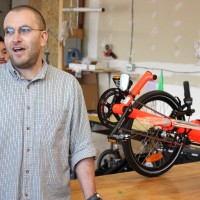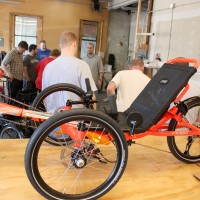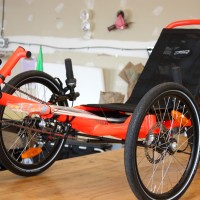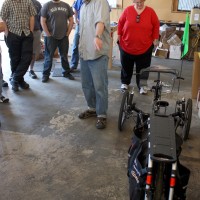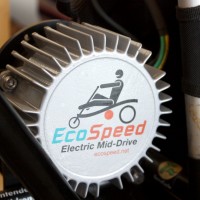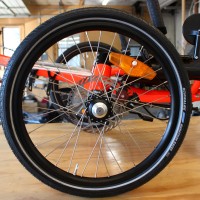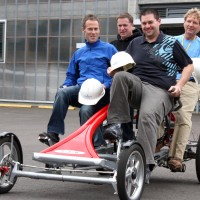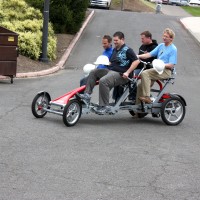This content was published: July 24, 2011. Phone numbers, email addresses, and other information may have changed.
PCC engineering students get up to speed with bike power
Photos and story by James Hill
Gregg Meyer, a civil and mechanical engineering technology instructor, and his students gathered around the small factory at EcoSpeed in Southeast Portland one sunny spring day. But Meyer couldn’t help himself.
“So do your motors have any internal reduction in them?” Meyer asked EcoSpeed representative Tad Beckwith.
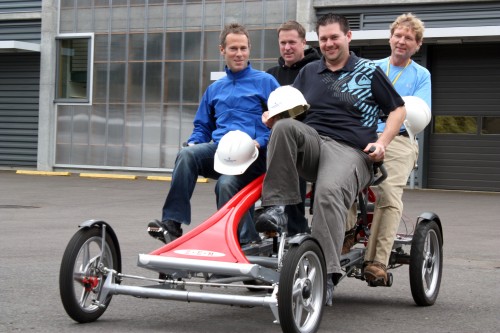
Gregg Meyer (far right) rides the Civil and Mechnical Enginnering Technology Program's new four-wheel cycle they plan to fit with an electric motor assist system.
“No,” Beckwith replied. “Just the motor attached to our gear box.”
“Ah the gear box!” said Meyer, eyes lighting up. “Everyone wants to see the gear box!”
And with that enthusiasm, Beckwith shows Meyer and the dozen students a planetary gear box, and in case you were wondering, the gear reduction ratio on those suckers is 4.5 to 1. This may be all engineer-speak at one of Portland’s bright lights in the electric bicycle business, but the tour EcoSpeed granted Meyer and his PCC students is an important part of learning at the college’s Civil and Mechanical Engineering Technology Program.
Meyer said his students learn to design systems comprised of individual elements such as springs, columns, beams, shaft and gear systems, pullies, brakes and clutches. You name it; they take it apart and analyze it. Bikes are a perfect mechanism for the students to study and Meyer has collected about a half dozen in the program’s shop in the bowels of the Automotive and Metals Building, including a four-wheeler they want to convert to electric-power assist. Bikes have key elements of machine design and students test that design’s strength and mechanics by measuring and analyzing shapes.
“For each of those main design systems I try to show them something in real life so that they’re not just looking in the textbook, reading chapters and equations,” Meyer said. “It’s an elaborate show-and-tell. They really get it more when they are playing with something.”
Meyer brings a certain funky and off beat approach to his teaching, much like his path to PCC. He had been a machinist building parts for the linear particle accelerator at Stanford University while earning a bachelor’s degree in mechanical engineering at Santa Clara.
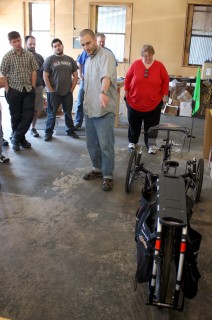
Tad Beckwith of EcoSpeed shows off a retrofit of a bicycle with his company's electric motor and gear box system.
After graduation, he found work at Hewlett-Packard.
“I got to wear shorts and T-shirt to work and we got to break stuff,” Meyer recalled. “We would design products, develop them and build prototypes. Then we would throw them on shaker tables and see where they broke. And, and if they didn’t break we’d make them smaller so they did break or if they did break we would make them a little stronger; it was all about design optimization.”
A corporate fellowship allowed him to earn a master’s degree from Georgia Tech. As a result, he soon became a design engineer and then slid into a good management job. But after years of missing being on the frontlines, Meyer turned in his resignation and looked to find another career that would get him jazzed again. He took an online Google survey that showed him what he should be doing and where he should be doing it – teaching and Portland.
After a stint at Mount Hood Community College, Meyer found a position at PCC’s Civil and Mechanical Engineering Technology Program, located on the Sylvania Campus, 12000 S.W. 49th Ave. He even walked into Program Chair Mike Kies’ office and asked, “Hey, got any teaching jobs?” He hasn’t looked back, now channeling his offbeat enthusiasm into finding more ways to get students as excited about engineering as he is.
“The idea of having something to attract future students is important,” Meyer said. “Once they are here it gives them an opportunity for a better education and that is really what it’s all about. We want to crank out better engineers. This program is outstanding and to teach for it is very rewarding.”
And what about that planetary gear box he scored from EcoSpeed?
“They seemed to really have a good time,” Meyer said of the tour. “I am going to pull apart that gear box we had over there and that will be a part of the lecture. We’ll see how a planetary gear box works.”

